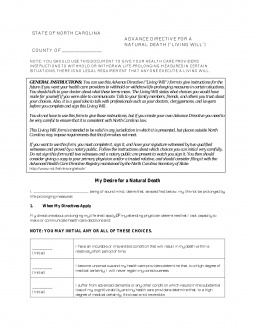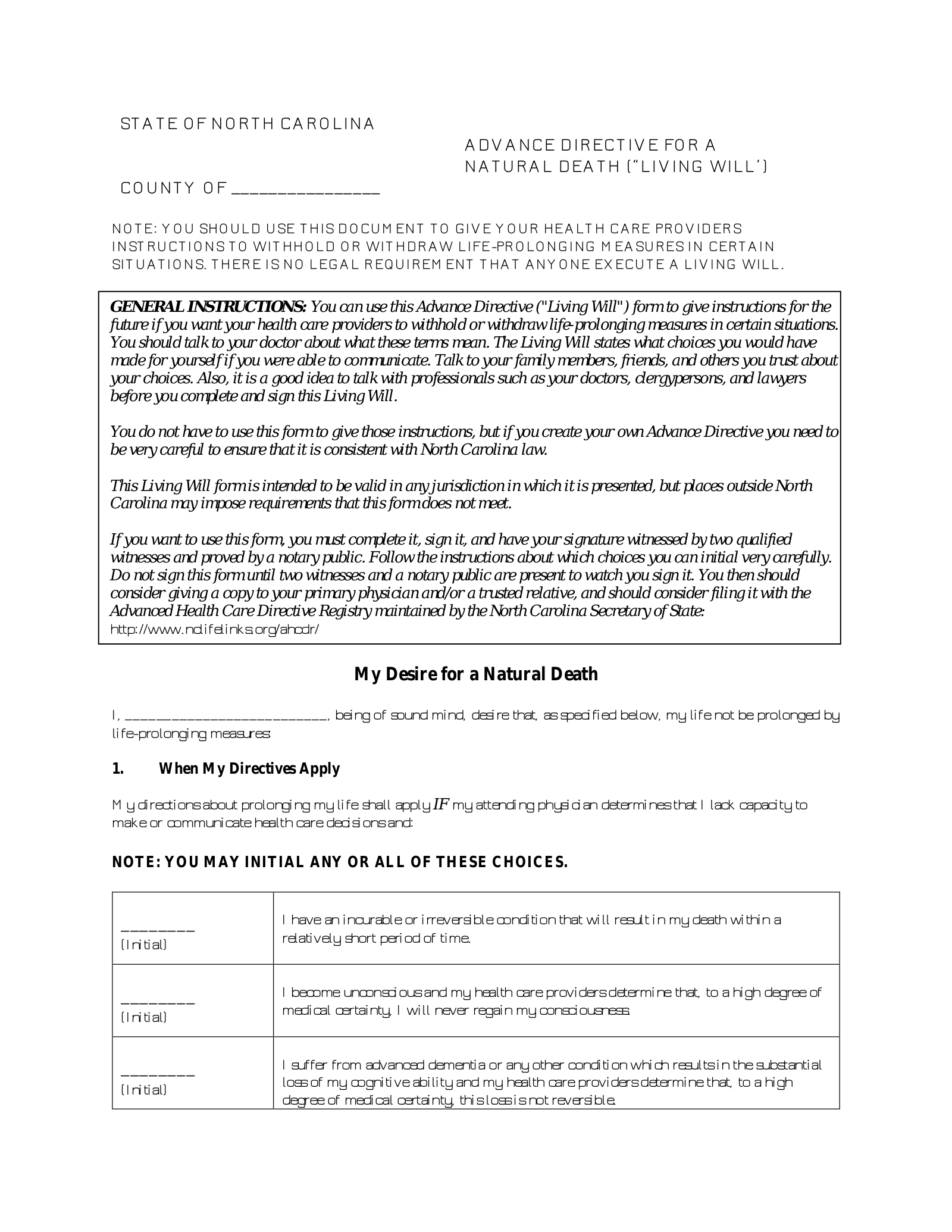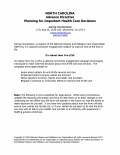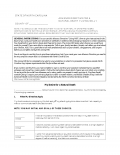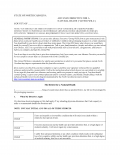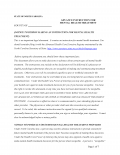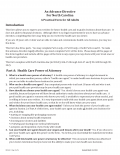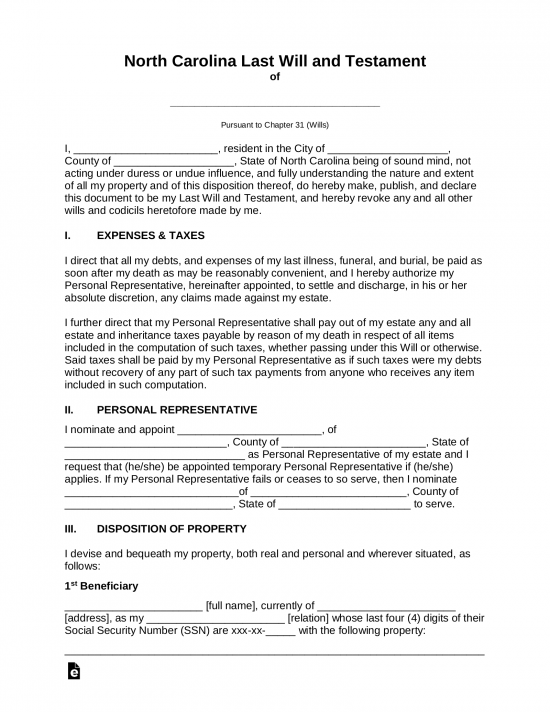Updated July 28, 2023
A North Carolina advance directive lets a person choose their end-of-life treatment options and select an “agent” to carry out specific instructions. The form only is for use when a person is no longer able to make decisions for themselves due to Alzheimer’s disease, dementia, or any type of incapacitation. The agent is commonly a spouse or family member and makes decisions based on the intentions in the directive.
Advance Directive Includes
Table of Contents |
Laws
Statute – § 90-320 to § 90-323,[1] § 32A-25.1[2]
Signing Requirements – Two witnesses and a notary public.[3][4]
Versions (6)
Download: PDF
Download: PDF
Download: PDF
Download: PDF
Download: PDF
Download: PDF
Registry
Download and complete the Registration Form and attach a $10 check made payable to the ‘Secretary of State’. Attach a copy of the advance directive and send to:
North Carolina Secretary of State
Advance Health Care Directive Registry
P. O. Box 29622 Raleigh, NC
27626-0622
How to Write
Download: PDF
Location Of Document Execution
(1) County. The county where this document is executed should be defined.

My Desire For A Natural Death
(2) Principal. Record the entire name of the North Carolina Declarant using this paperwork to instruct Physicians and Medical Professionals in this state on the treatment he or she requires when rendered incapable of communication and requiring medical care.

Article 1 When My Directives Apply
Initial Any Combination of Items 3, 4, And 5
(3) Irreversible Condition That Is Fatal. It will be crucial for the function of this document that North Carolina Health Care Providers know when the Declarant wants his or her treatment instructions followed. If the North Carolina Declarant intends for this document to be consulted to obtain his or her authorized treatments when he or she is diagnosed with an incurable, irreversible, or otherwise untreatable condition that causes death in a short amount of time, then he or she must initial the declaration statement contained in the first row.
(4) Long-Term To Permanent Unconsciousness. The second row of the first table informs North Carolina Physicians that the Declarant wishes his or her preferences put into action when a medical condition has caused a permanent state of unconsciousness that holds nearly no chance of recovery. The North Carolina Declarant must submit his or her initials to adopt this declaration.
(5) Significant Loss Of Cognition. The North Carolina Declarant can inform Physicians in this state to use this document when seeking his or her treatment instructions while unable to make decisions or communicate as a result of suffering the late stages of an incurable neurodegenerative condition. This can be conveyed only if the North Carolina Declarant initials the final row.
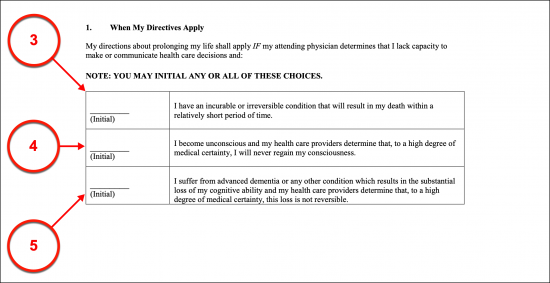
Article 2 These Are My Directives About Prolonging My Life
(6) Level Of Withholding Decision. The North Carolina Declarant can give Medical Professionals the ability to decide to hold or deny life-prolonging measures based on the current medical condition and the content of this document or deliver definitive instructions to withhold or withdraw.

Article 3 Exceptions – “Artificial Nutrition Or Hydration”
Initial Only One Item
(7) Request For Artificial Nutrition And Hydration. The North Carolina Declarant has the option of issuing a statement regarding artificially delivered nourishment as well as fluids or water. To instruct North Carolina Health Care Professionals that the Declarant behind this form must have his or her nutrition and fluid levels maintained to a healthy degree even if that means they must be delivered through a tube or an I.V., the North Carolina Declarant must initial the appropriate statement.
(8) Allowing Artificial Hydration Only. If the North Carolina Declarant wishes to have his or her hydration maintained when unable to take in water independently, then he or she should initial the second statement. This statement will also include the refusal to have nutrients delivered by tube or I.V. to the Declarant when unable to eat, unable to communicate, and suffering an irreversible condition that results in death, permanent unconsciousness, and/or a significant loss of cognition.
(9) Accepting Only Artificial Nutrition. A final option allows the North Carolina Declarant to accept medically delivered nutrition (i.e., an I.V. or an inserted tube) but denies the delivery of water/fluids. The North Carolina Declarant’s initials are the only acceptable instrument for this instruction to be made to attending Medical Professionals in this state.
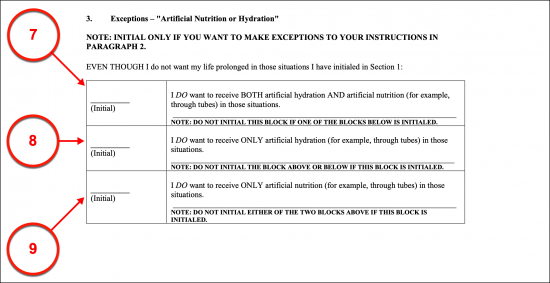
Article 6. If I have An Available Health Care Agent
Select Only One Item
(10) Follow Advance Directive. Article 6 enables the North Carolina Declarant to insist that the Advance Directive (this document) being developed take precedence over the instructions of his or her Health Care Agent once the Declarant delivers his or her initials to the first statement.
(11) Follow Health Care Agent. The North Carolina Declarant’s Health Care Agent can be granted precedence over this document when treatment decisions are needed from the North Carolina Declarant while he or she is incapacitated with a severe medical condition. This ability to override can only be granted if the North Carolina Declarant initials his or her approval to this statement.
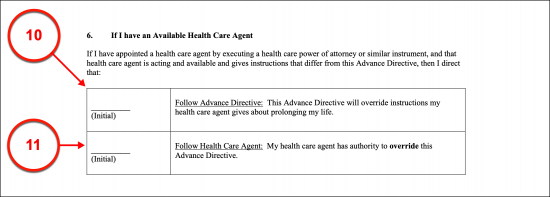
North Carolina Principals Signing
(12) Signature Date Of North Carolina Declarant. The signature of the North Carolina Declarant is mandatory for this document. It must be dated and supplied while two adult Witness as well as a licensed Notary Public observe this act. Therefore, immediately before signing his or her name, the North Carolina Declarant must dispense the current date to this form.
(13) North Carolina Declarant’s Signature. The North Carolina Declarant must sign this paperwork in an appropriate manner to execute it.
(14) North Carolina Declarant’s Printed Name.
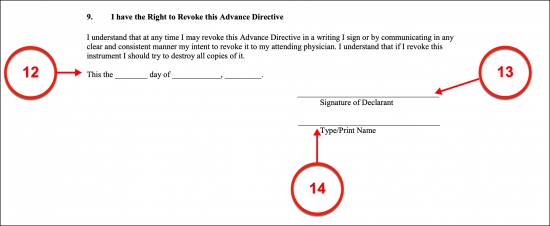
Witness Statement
(15) Preparation Of Witness Statement. The full name of the North Carolina Declarant must be used to complete the signature confirmation statement on display.
(16) Dated Witness Signatures. Both Witnesses must establish that neither is employed by a Health Care Provider or Facility responsible for the Patient’s care and that each has watched the North Carolina Declarant sign this document in a responsible manner by providing a dated signature. Notice that the signature date each Witness records before signing this document must be the current calendar date and be the same day as the Declarant’s signature date.
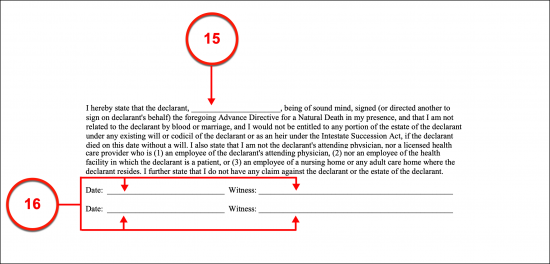
Notarization For North Carolina Declarant Signature
(17) Notary Public Action. Upon the completion of the above signatures, the Notary Public overseeing the North Carolina Declarant’s act of signing will complete the notarization section.
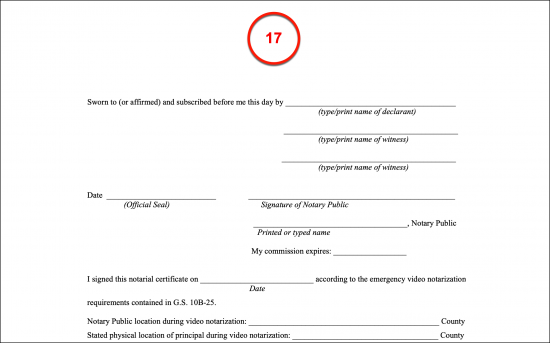
North Carolina Medical Orders For Scope Of Treatment
(18) North Carolina Patient Name. If the North Carolina Patient wishes to issue formal medical orders concerning the treatment he or she wishes to receive (or deny) when he or she is uncommunicative and requires treatment intervention or a significant amount of medical care administered to continue living, then he or she must complete the North Carolina MOST (Medical Orders For Scope Of Treatment) with the cooperation of a licensed Physician, Physician’s Assistant, or Registered Nurse. This process begins with a record of the North Carolina Patient’s name produced to the top of the form.
(19) Date Of Effect. Document the calendar date when the North Carolina Patient’s treatment instructions, as presented in this MOST, first become active medical orders to North Carolina Medical Staff attending to the concerned Patient’s health care.
(20) Carolina Patient’s Date Of Birth. Solidify the North Carolina Patient’s identity with his or her date of birth.
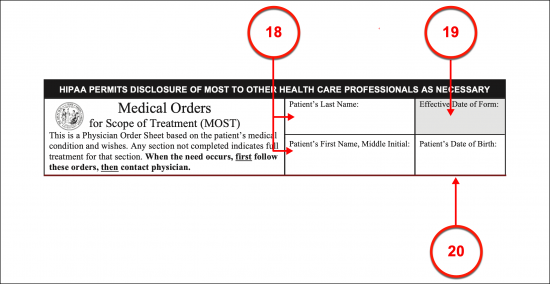
Section A Cardiopulmonary Resuscitation
(21) CPR Directive. North Carolina First Responders, Physicians, and other Medical Personnel will immediately attempt to resuscitate a Patient’s heart or lungs should either or both cease functioning. When either of these organs stops, the brain will not be able to receive oxygen and death should be considered inevitable within a short period of time. Cardiopulmonary resuscitation will employ a variety of methods such as mechanical aid, electric stimulation, intubation, and/or chemical stimulants. To allow all CPR methods known to be administered, the first checkbox in Section A must be selected.
(22) DNR. Select the second checkbox statement on this topic to inform North Carolina Health Care Professionals that the Declarant does not wish to be resuscitated should his or her cardiopulmonary system fails.

Section B Medical Intervention
Select Item 23 Or Item 24 Or Item 25
(23) Full Scope Of Treatment. If a medical condition does not prevent the North Declarant’s heart and lungs to function but does incapacitate him or her, Doctors in this state will act accordingly (as a default) to extend the Patient’s life. To provide the North Carolina Patient’s authorization of all treatments necessary to prolong his or her life, the “Full Scope Of Treatment” directive must be selected as the medical order for this Patient.
(24) Limited Additional Interventions. If the North Carolina Declarant indicates that he or she wishes some life-prolonging measures to be used but does not wish to accept overly invasive maneuvers, then select the second directive provided.
(25) Comfort Measures. Treatment could be approved for comfort over longevity by selecting the directive “Comfort Measures.” Here, the North Carolina Patient does not wish to receive any life-prolonging treatment unless it is needed to manage pain or keep him or her comfortable.
(26) Other Instructions. An additional area where follow-up instructions to the North Carolina Patient’s treatment instructions is available. For instance, if the North Carolina Patient has indicated a trial period for treatment then the details of this trial must be included.
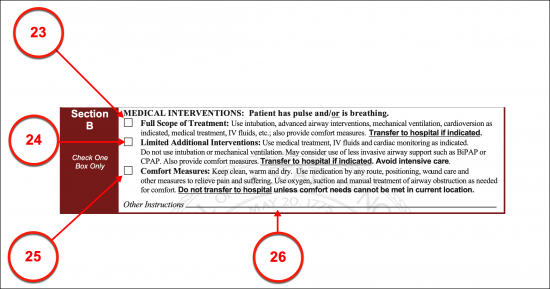
Section C Antibiotics
Choose Item 27, Or Item 28, Or Item 29
(27) Antibiotics Approval. Some infection treatments may be needed while the North Carolina Declarant is unconscious, does not possess reliable cognizance, and suffering a debilitating condition.
(28) Infection Evaluation Request. North Carolina Medical Staff reviewing this paperwork can be instructed to first consider the negative impacts of an antibiotic course then evaluate it using the Declarant’s directives.
(29) Denial Of Antibiotics. The third directive of Part C should be selected only if the Declarant insists that antibiotics are not administered under any circumstances even if other measures must be used to treat an infection.
(30) Other Instructions. If the North Carolina Patient has indicated that additional preferences regarding the use of antibiotics should be applied then deliver such preferences to the space provided.
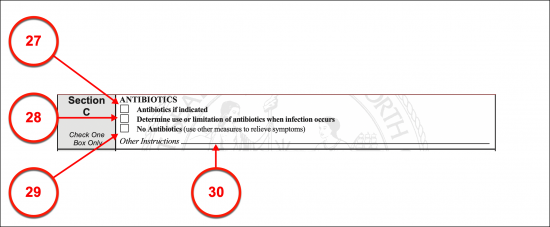
Section D Medically Administered Fluids And Nutrition
Select Only One Directive From Item 31 And Only One Directive From Item 32
(31) North Carolina Patient’s IV Fluid Directive. Section D presents two columns. Only one selection may be made from each. The left-hand column should be used to explain the Declarant’s willingness to have fluids administered through an I.V. This section should be used to set the medical orders of this document to authorize the administration of I.V. Fluids as needed, to only approve of a trial period when I.V. Fluids are needed, or to indicate that the North Carolina Declarant refuses to accept I.V. Fluids delivered.
(32) Instructions For Feeding Tube In North Carolina. The right-hand column shall discuss the topic of a feeding tube. This is administered when the Patient can no longer eat, break down nutrients, or risks choking even through hand-assisted feedings. Mark the appropriate box to demonstrate that the North Carolina Declarant will accept nutrients delivered through a tube, intends to only authorize delivery of nutrients by tube for a limited period of time, or completely refuses to have a tube inserted to receive nourishment.
(33) Other Instructions. It is important that the North Carolina Patient’s expectations regarding the tube feedings or I.V. fluids are fully presented. Utilize the space provided to make sure all of the North Carolina Patient’s remaining instructions on the artificial delivery of nutrients and/or fluids are included in this section.
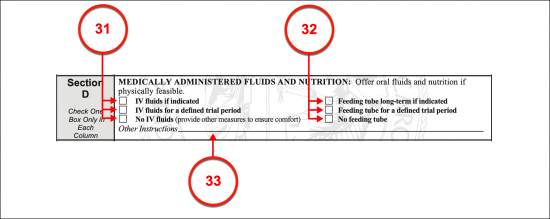
Section E Discussed With And Agreed To
(34) Patient Confirmation. The Party that has aided the North Carolina Doctor in presenting the Patient or Declarant’s treatment instructions must be identified. If the North Carolina Patient is directly working on this document, then demonstrate this fact by selecting the first box in Section E.
(35) Directly Authorized Representative. These medical orders can be composed between a Doctor and a properly appointed Representative of the North Carolina Declarant. If this is the case, then indicate if this is the North Carolina Principal’s Parent/Guardian, Health Care Agent, Legal Guardian (Court-Appointed), or the Patient’s Spouse by selecting the appropriate description.
(36) Acceptable Representation. Entities such as a Majority of the Declarant or Patient’s available Parents/Adult Children, the Declarant’s Adult Siblings, or an Individual with a previous and well-known relationship to the Patient (i.e., a Life-Partner, Long-time Fiancé, or Life-long Friend) may be responsible for presenting the North Carolina’s medical instructions in this form. If so, then mark the checkbox corresponding to the most accurate description of the Party(ies) representing the Patient’s medical preferences through this document.
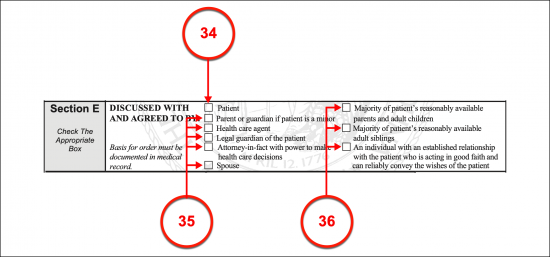
Signature Authorization For Medical Treatment Orders
(37) MD/DO, PA, Or NP. The full name of the North Carolina Medical Professional should be reported to this document.
(38) MD/DO, PA, NP. The North Carolina Physician, Physician’s Assistant, or Nurse Practitioner working with the Declarant above must sign his or her name then record the current date.
(39) Phone #. Produce the North Carolina Medical Professional’s Office or Practice’s telephone number.

(40) Patient Or Representative Name. The North Carolina Declarant (Patient or Representative) must present his or her printed name.
(41) Relationship To Declarant. The Declarant behind the medical orders presented above must sign his or her name.
(42) Relationship. The way in which the Declarant knows the Patient is an expected definition. If the North Carolina Patient worked on his or her behalf then, the word “Self” should be entered, otherwise, the relationship held between Representative, and Declarant must be defined.

Contact Information
(43) Patient Representative Information. As mentioned earlier, a Representative or Guardian of the Patient may make the decisions above or convey them as medical orders with the North Carolina Medical Professional above on behalf of the Patient. If so, then the identity of the North Carolina Patient Representative must be solidified with a presentation of his or her full printed name. This should be accompanied by a record of how the Representative is related to the Patient as well as the North Carolina Patient Representative’s telephone and cell phone numbers.
(44) Health Care Professional Information. The Party who has prepared this form for execution by physically documenting information to its content must self-report by name, dispense the title he or she holds with the Doctor’s Office or Medical Facility where this form originated, his or her contact number (telephone, cell, and/or office number), and document the date of this paperwork’s completion.
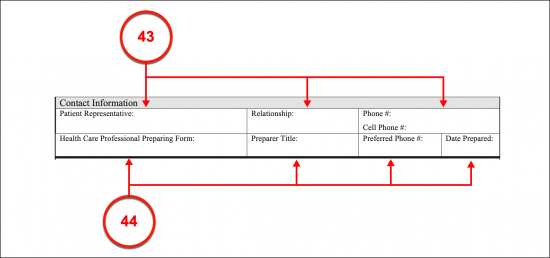
Review Of The MOST
(45) MOST Update Table. The completed medical orders should be reviewed periodically to ensure that the North Carolina Patient’s medical instructions remain up-to-date. For this task, the “Review Of MOST” table should be completed during follow-up interviews with the North Carolina Declarant. Items such as the interview’s date, location, Interviewer signature, Patient (or Representative) signature, and the outcome of follow-up should be documented.

Related Forms
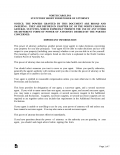 Durable (Financial) Power of Attorney
Durable (Financial) Power of Attorney
Download: PDF, MS Word, OpenDocument
Download: PDF, MS Word, OpenDocument
Sources

